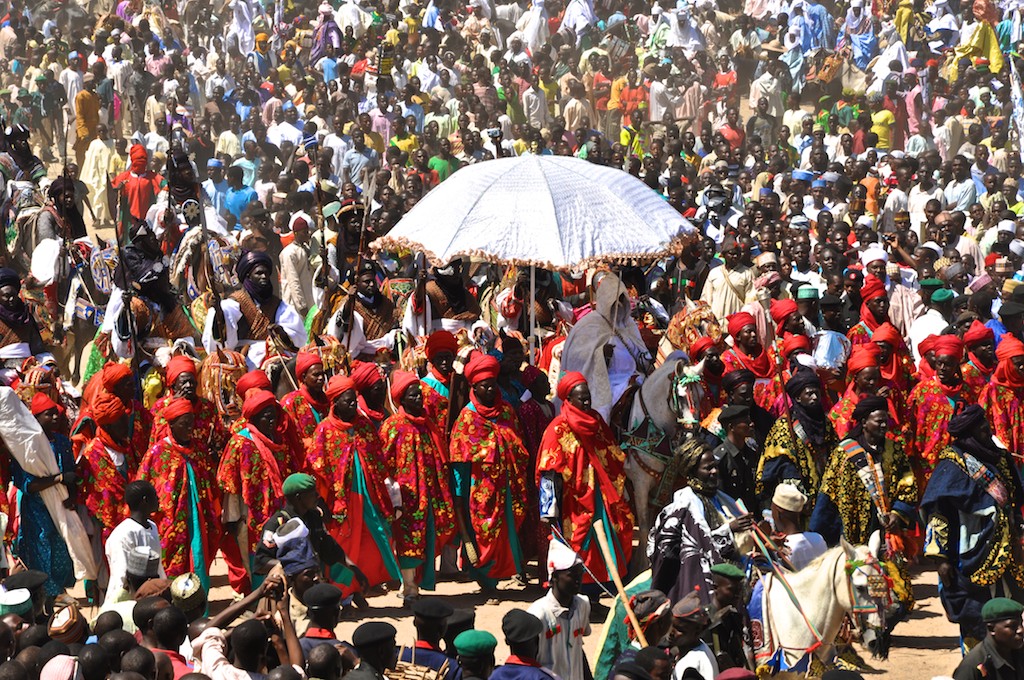IT comes by different names, the most popular being eid adha and eid kabir. It is easily the biggest festival in the Islamic calendar and often symbolises the end of the Hajj exercise and the slaughtering of acceptable animals by adult Muslims.
Eid-el-kabir, at it is more commonly known in Nigeria, begins on the 10th of Dhu’l-Hijra, the last month of the Islamic calendar, and lasts for four days. It begins the day after Muslims on the Hajj descend from Mount Arafat.
The sacrifice (called Udhiyah in Arabic) is the Sunnah (practice) of Prophets Ibrahim, Ismail and Muhammed. It reminds Muslims of the great sacrifice that Prophet Ibrahim and son (Ismail) were willing to do for the sake of Allah. Allah spared the life of Ismail and enjoined Muslims to ransom him with a momentous sacrifice, as recorded in the Quran (As-Saffat 37: 107).
The holy Prophet Muhammad said: “Allah has commanded goodness on everything. So, when you want to kill; kill in an honourable manner, when you want to slaughter; slaughter in a honourable manner. And let the one of you (who wants to slaughter) sharpen his/her knife and let him allow the sacrificial animal to rest (before killing it).” One of the foremost Islamic scholars, Shaykh Muhammad Saalih Ibn Uthaymeen noted in his book, ‘Talkhees Ahkaam-ul-Udhiyah wadh-Dhakaat’ that there are certain etiquettes one must abide by when slaughtering an animal for a sacrificial offering.
However, he said these etiquettes are not conditional for the validity of a sacrifice. So, the sacrifice is still valid even in their absence. Among these etiquettes are:
• He should face the Qiblah with the animal at the time of slaughtering.
• He must slaughter the animal in a good manner, which is by quickly and firmly passing a sharpened blade over the neck area.
• The slaughter of a camel must be done by cutting the area just below the neck and above the chest. This is known as nahr. As for all other types of animals, their necks should be sliced. As for all of the other animals, they are to be slaughtered, while lying flat on their left side. However, if the one slaughtering is a lefty, he may use his left hand and lay the animal down on its right side. This is so long as doing it this way is easier upon the animal and more convenient for the one slaughtering.
• The throat and esophagus of the animal should be cut in addition to its jugular veins.
• The blade should be concealed from the view of the animal, when sharpening it. This means that the animal should not see the blade until the time of the actual slaughter.
• One should glorify Allah (by saying Allaahu Akbar) after mentioning His Name (by saying Bismillaah) when slaughtering.
• One may name the person whom the sacrificial offering (udhiyah) is being performed for after mentioning Allah’s Name and glorifying Him. He should also ask Allah to accept it from him. So, for example, he should say: “In the Name of Allah, Allah is the Greatest.”
Men, women and children are expected to dress in their finest clothing to perform the Eid prayer in a large congregation in an open field. Affluent Muslims who can afford to, sacrifice their best domestic animals (usually a cow, but can also be a camel, goat, sheep or ram depending on the region) as a symbol of Ibrahim’s willingness to sacrifice his son. The sacrificed animals have to meet certain age and quality standards or else the animal is considered an unacceptable sacrifice.
The meat from the sacrificed animal is preferred to be divided into three parts. The family retains one third of the share; another third is given to relatives, friends and neighbors; and the remaining third is given to the poor and needy. Though the division is purely optional wherein either all the meat may be kept with oneself or may be given away to poor or needy, the preferred method as per the practice of Prophet Muhammad is dividing it in three parts.
Meanwhile, the sale of rams this year is the lowest ever recorded compared to the previous years. Despite the reduction of the prices of rams which ranges from N25,000 to N230,000 depending on their sizes compared to last year that the cheapest ram was N120,000.
The sellers blamed the low sales on the bad economy. A ram seller simply identified as Mr. Musa told The Guardian that most of his customers complained of lack of money, that they have to pay their children’s school fees and house rents. Some buyers also complained of low income saying they cannot afford the rams. They prefer to celebrate a low-key Eid-el-Kabir or join their neighbours to buy and share a ram.


No comments:
Post a Comment